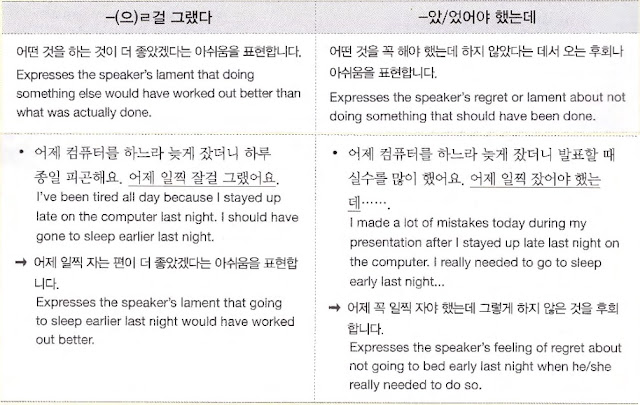가: 마크 씨, 책의 내용을 요약해 보세요.
Mark, please summarize the contents of the book.
나: 잘 모르겠습니다, 교수님. 책을 미리 읽어 왔어야 했는데 죄송합니다.
Professor, I don’t know it (the content). I should have read the book in advance, and I’m sorry (that I didn’t).
가: 자야 씨가 왜 그렇게 화가 났어요?
Why is Jaya so angry?
나: 제가 자야 씨한테 뚱뚱해 보인다고 했거든요. 그런 말을 하지 말았어야 했는데 후회가 돼요.
I told her she looked fat. I shouldn’t have said such a thing, and now I regret it.
This expression is used to indicate regret or lament about the fact that a necessary action was not completed or that some necessary state was not achieved.

가: 어제 발표회는 잘 끝났어요?
Did the conference end well yesterday?
나: 아니요. 발표회장이 시원했어야 했는데 더워서 그런지 중간에 나가 버리는 사람들이 많더라고요.
No, the conference venue was supposed to be cooled (air conditioned), and (probably) because of the heat, a lot of people left midway through.
가: 이사한 집이 너무 문제가 많다면서요?
Is it true that you’re having a lot of problems with your new home?
나: 네, 집을 계약하기 전에 꼼꼼하게 살펴봤어야 했는데 집이 좋아 보여서 그러지 않았어요.
Yes, we should have inspected the house carefully before signing the contract, but it looked so nice that we didn’t do so.
가: 김 대리, 왜 이렇게 보고서에 틀린 게 많지요?
Agent Kim, why are there so many mistakes in the report?
나: 죄송합니다. 제가 다시 한번 검토를 했어야 했는데 안 했더니 틀린 게 많은 것 같습니다.
I’m sorry. I should have looked it over once more, but I didn’t, and that’s why there are so many mistakes.
The expression -았/었어야 했는데 can also be used at the ends of sentences. In such cases, the original part that would have followed -았/었어야 했는데 is omitted.
가: 아이들에게 줄 크리스마스 선물 샀어요?
Did you buy any Christmas presents to give the kids?
나: 아니요, 오늘 가니까 선물이 다 팔렸더라고요. 미리 사러 갔어야 했는데…
No, when I went today, they were all sold out. I should have gone to buy them earlier…
Here, a statement like 미리 안 간 것이 후회돼요 (I regret not going more in advance) or 어떡하죠? (What should we do) has been omitted after 사러 갔어야 했는데.
While the expressions -(으)ㄹ걸 (그랬다) and -았/었어야 했는데 are used similarly, they are different in the following ways.


